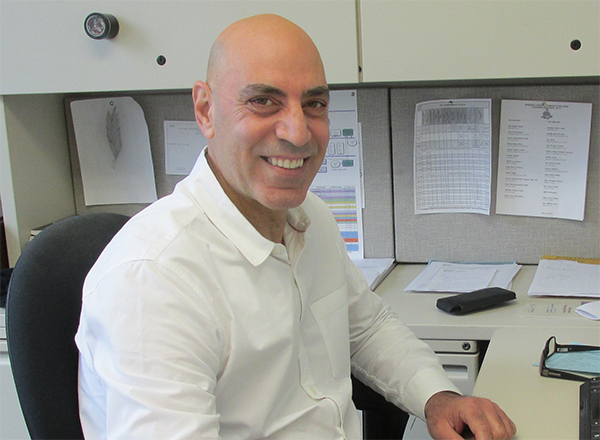Student Services Spotlight: Counseling

This article is part of a series highlighting our Student Services offices and what they can do for you. For information about all HFC student services, please visit the Student Services section of our website.
The HFC Counseling Office in Rm. A-117 of the Learning Success Center (Bldg. A) has redoubled its efforts in order to serve students during the coronavirus pandemic.
“This pandemic has been a life-changer that has affected everyone, including the administration, faculty, and students at HFC, as well as the students’ families,” said Dr. Ibrahim Atallah, Associate Dean of Counseling at HFC. “Students need to be flexible, opened-minded, and must embrace this challenge. Faculty and students alike have had to look at this pandemic not just as a challenge but as an opportunity for growth and learn to do things in ways unlike before. There seems to be a higher level for personal accountability, time management, etc., and students have to be flexible in getting things done.”
Atallah pointed out that taking classes online is not new, but has become more mainstream out of necessity. No matter what platform students use to take classes, the Counseling Office’s top priority is helping students achieve their academic goals.
“That will never change. Counselors are person-centered – or student-centered, in our case. Our goal right now is to making counseling to students more accessible and make students more aware of our services,” said Atallah.
Being more visible and more available to students
In its efforts to be more visible to students, HFC counselors are available by appointment online via Microsoft TEAMS (the primary medium in which counselors and students are interacting because there is a face-to-face connection). Students can also speak to counselors via phone if they prefer.
According to Atallah, counselors assist students with a variety of needs, such as mental health, classes, and careers. Examples of this include:
• Learning how to cope with anxiety
• Learning interpersonal skills
• Conflict resolution with faculty and classmates
• Stress management
• Test-taking anxiety
• Addictions
• Veterans issues
• Cross-cultural and adjustment issues
• Other mental health issues
The Counseling Office also assists students in the following academic and career areas:
• Returning students who need to readjust to an academic environment
• Assessments to determine interests and assist in career planning (FOCUS 2 Career Assessment)
• Exploring career options
• Choosing an academic program
• Transferring to a 4-year college or university upon completing your HFC program
• Suspension Appeal Process
• Academic Probation
• Dismissal
• Program evaluation and graduation planning
The difference between a counselor and academic advisor
Atallah spoke about the differences between a counselor and an academic advisor. In order to be a counselor, you must have a master’s degree in counseling and be a licensed professional counselor (LPC) through the State of Michigan.
In addition to being able to provide mental health treatment, counselors are also trained in career counseling and assessment, which is part of the counseling profession, according to Atallah. Academic advisors are not LPCs. They help students with their academic planning, such as the sequence of classes they must take in their specific program.
“We strive to serve students in whatever way possible, whether it’s their mental health needs, their emotional needs, and their academic needs in order for them to succeed in their personal lives and academic lives,” said Atallah.
NOTE: If you are seeking guidance about which specific classes to take, visit Academic Advising, where a specific advisor is assigned to help you. Your advisor will know your program and academic goals. See our companion article about Academic Advising and Student Success.
Pulling together
One of the biggest hurdles Atallah and his colleagues have helped students overcome is managing the frustration with technology. Some students are tech-savvy and have access to technology to take classes remotely. Others needed some coaching to become more tech-savvy. There were also some who had limited access to technology, and the College provided Chromebook laptops to accommodate them.
“I am proud of how the administration, faculty, and staff of HFC – particularly Counseling and the IT department – have pulled together to assist our students in this unprecedented time,” said Atallah. “They provided students with access to technology and decreased their stress and anxiety levels during the time the College was transitioning to an online format. Everyone was always around to assist students in any way possible, which has made me very proud.”
To make a counseling appointment, contact counseling@hfcc.edu.